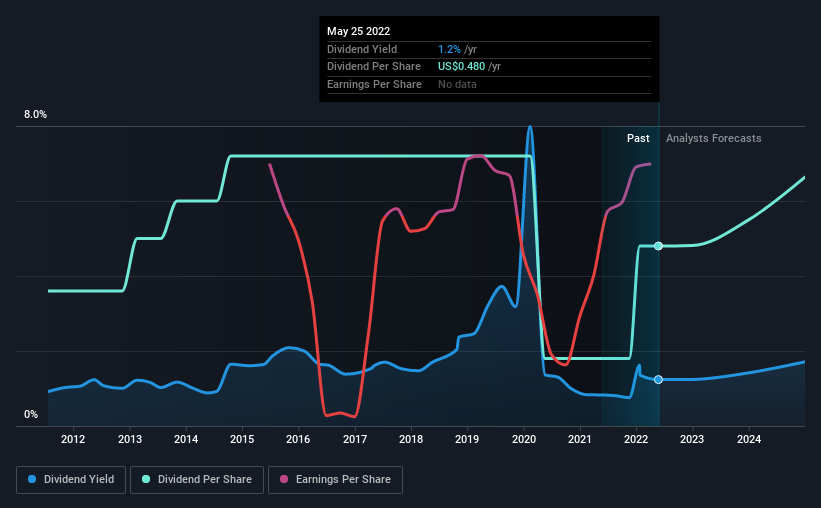Halliburton Company (NYSE:HAL) Stock Goes Ex-Dividend In Just Four Days
Halliburton Company (NYSE:HAL) stock is about to trade ex-dividend in four days. The ex-dividend date is one business day before a company's record date, which is the date on which the company determines which shareholders are entitled to receive a dividend. The ex-dividend date is an important date to be aware of as any purchase of the stock made on or after this date might mean a late settlement that doesn't show on the record date. Accordingly, Halliburton investors that purchase the stock on or after the 31st of May will not receive the dividend, which will be paid on the 22nd of June.
The company's next dividend payment will be US$0.12 per share, and in the last 12 months, the company paid a total of US$0.48 per share. Looking at the last 12 months of distributions, Halliburton has a trailing yield of approximately 1.2% on its current stock price of $38.78. Dividends are an important source of income to many shareholders, but the health of the business is crucial to maintaining those dividends. We need to see whether the dividend is covered by earnings and if it's growing.
Check out our latest analysis for Halliburton
Dividends are usually paid out of company profits, so if a company pays out more than it earned then its dividend is usually at greater risk of being cut. Halliburton is paying out just 15% of its profit after tax, which is comfortably low and leaves plenty of breathing room in the case of adverse events. Yet cash flow is typically more important than profit for assessing dividend sustainability, so we should always check if the company generated enough cash to afford its dividend. Thankfully its dividend payments took up just 30% of the free cash flow it generated, which is a comfortable payout ratio.
It's positive to see that Halliburton's dividend is covered by both profits and cash flow, since this is generally a sign that the dividend is sustainable, and a lower payout ratio usually suggests a greater margin of safety before the dividend gets cut.
Click here to see the company's payout ratio, plus analyst estimates of its future dividends.
Have Earnings And Dividends Been Growing?
Companies that aren't growing their earnings can still be valuable, but it is even more important to assess the sustainability of the dividend if it looks like the company will struggle to grow. If earnings decline and the company is forced to cut its dividend, investors could watch the value of their investment go up in smoke. It's not encouraging to see that Halliburton's earnings are effectively flat over the past five years. Better than seeing them fall off a cliff, for sure, but the best dividend stocks grow their earnings meaningfully over the long run.
The main way most investors will assess a company's dividend prospects is by checking the historical rate of dividend growth. In the past 10 years, Halliburton has increased its dividend at approximately 2.9% a year on average.
Final Takeaway
Is Halliburton worth buying for its dividend? While it's not great to see that earnings per share are effectively flat over the 10-year period we checked, at least the payout ratios are low and conservative. All things considered, we are not particularly enthused about Halliburton from a dividend perspective.
In light of that, while Halliburton has an appealing dividend, it's worth knowing the risks involved with this stock. Our analysis shows 1 warning sign for Halliburton and you should be aware of this before buying any shares.
Generally, we wouldn't recommend just buying the first dividend stock you see. Here's a curated list of interesting stocks that are strong dividend payers.
Have feedback on this article? Concerned about the content? Get in touch with us directly. Alternatively, email editorial-team (at) simplywallst.com.
This article by Simply Wall St is general in nature. We provide commentary based on historical data and analyst forecasts only using an unbiased methodology and our articles are not intended to be financial advice. It does not constitute a recommendation to buy or sell any stock, and does not take account of your objectives, or your financial situation. We aim to bring you long-term focused analysis driven by fundamental data. Note that our analysis may not factor in the latest price-sensitive company announcements or qualitative material. Simply Wall St has no position in any stocks mentioned.

